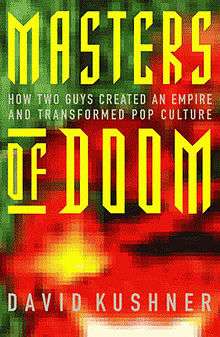Masters of Doom
 | |
| Author | David Kushner |
|---|---|
| Country | United States |
| Language | English |
| Genre | History |
| Publisher |
Random House Audiobooks.com (Audiobook) |
Publication date |
May 6, 2003 (Hardcover) May 11, 2004 (Paperback) May 15, 2012 (Audiobook) |
| Media type |
Print (Hardcover) Print (Paperback) Audiobook |
| Pages |
352 (Hardcover) 368 (Paperback) |
| ISBN |
0-375-50524-5 (Hardcover) ISBN 0-8129-7215-5 (Paperback) |
| OCLC | 50129329 |
| 794.8/092/2 B 21 | |
| LC Class | GV1469.15 .K87 2003 |
Masters of Doom: How Two Guys Created an Empire and Transformed Pop Culture is a book by David Kushner about id Software and its influence on popular culture, focusing chiefly on the company's co-founders John D. Carmack and John Romero.
An audiobook version of "Masters of Doom" narrated by actor Wil Wheaton was released on May 15, 2012 by Audiobooks.com.[1]
Content
The book describes the "Two Johns'" respective childhoods, their first meeting at Softdisk in 1989 and the eventual founding of their own company, id Software. It discusses in detail the company's first successes, the popular and groundbreaking Commander Keen and Wolfenstein 3D games, as well as the new heights the company reached with Doom, which granted the company unprecedented success, fame and notoriety. It also discusses id's next project, Quake, as well as the aftermath of Romero's departure from the company and his founding – and the eventual collapse – of Ion Storm, his new game development studio. Kushner also describes the new gamer culture created by Doom and its impact on society.
While the games themselves are discussed in detail, Kushner's main focus is in the work dynamic and personalities that enabled their creation. He describes Carmack and Romero as the driving forces of id Software, but with very different personalities: Romero is presented as having unbridled creativity and considerable skill, but he loses focus when the spectacular success of the games allows him to adopt a rock star-like public persona. Carmack, on the other hand, is depicted as an introvert, whose unparalleled programming skills are the backbone of id Software, enabling the company to create extremely sophisticated games. However, he has little interest in – or even understanding of – the social niceties that enable people to enjoy working together.
Much of the book concentrates on this dynamic. While the two men initially complement each other well, eventually conflicts develop, leading Romero to be fired from the company. Carmack, the skilled creator of the complicated and fast game engines the company's products use, is repeatedly referred to as the only person in the company who isn't expendable, and this gives him a great degree of authority and influence. However, this influence transforms id Software into a considerably less pleasant and fun place to work and causes the company's games to become increasingly repetitive, despite their technological sophistication. Romero is on the opposite end of the spectrum; his Ion Storm is intended to be a very fun place to work, where "[game] design is law" (Ion Storm's slogan was "Design is Law") and that technology must be created to realize the designer's vision, instead of the other way around. However, his lack of management and organizational focus leads to poor and financially disastrous results.
Although Kushner adopts a novel-like narrative, Masters of Doom is a work of journalism. According to Kushner's notes in the book, it is based on hundreds of interviews conducted over a six-year period. Kushner was an early entrant into the field of video-game journalism, and recycled some of his own original reporting in the book.
In 2005, author David Kushner reported that a film based on the book was in development.[2]
Controversy
Michael Wilson sued publishing giant Random House Inc. on May 10, 2005, over the book's claim that Wilson had inappropriately used company funds. David Anderson, a University of Texas School of Law professor who specializes in torts and mass communications law, said the standard of proof in defamation suits such as Wilson's hinges on whether the plaintiff is considered a public figure. "The burden is on Wilson to show the statement is false, Anderson says. It's not enough for a plaintiff to show a statement is technically wrong."[3]
See also
References
- This article uses content from the GFDL Doom Wiki article "Masters of Doom"
- ↑ "Masters of Doom launched today exclusively through Audiobooks.com". Audiobooks.com.
- ↑ Gibson, Ellie. "Masters of Doom movie confirmed". Eurogamer.
- ↑ http://www.law.com/jsp/article.jsp?id=1117616720269
External links
- Random House's official Masters of Doom Page
- Audiobooks.com's Masters of Doom Release Page
- Author David Kushner's Website
- Video Game Exec Sues 'Masters of Doom' Publisher for Libel
- Masters of Doom GameSpy Coverage
| ||||||||||||||||||||||||||||||||||||
| ||||||||||||||